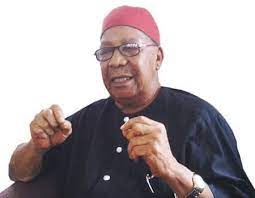
Ten things to note about the foremost nationalist.
1. He was born in Ukpor, near Nnewi in Anambra State in 1929. He attended the Catholic Primary School, Nnewi before proceeding to St. Mary’s Catholic School, Umuahaba, for his Standard Three, after which he also proceeded to Ukwa Central School to conclude his Standards Five and Six, which was the end of primary education then.
2. His father died when he was four years old, thereby leaving the responsibility of furthering his education and upbringing in the hands of his elder brother, who enrolled him at Etukokwu College, Nnewi, where he finished and did what they called Senior Cambridge Examination in those days.
3. In his final year at Etukokwu College in 1947, he joined the Zikist Movement, founded as a radical wing of the biggest national political party in the country known as the NCNC. The late Dr Herbert Macaulay was the president-general of the party while Dr Nnamdi Azikiwe was the secretary-general.
4. He had a brief teaching experience at St. Patrick’s College, Asaba. While in Asaba, he escaped drowning at the River Niger on one occasion, when he had gone swimming with other friends, on that particular day, he didn’t know when he drifted into a cyclone, which got hold of him and sank him deep down into the bottom of the river. As he was struggling to free himself, he had drunk up to nearly a gallon of water before the older swimmers saw what was happening and came to his rescue.
5. After a lecture they organised in Lagos in October 1949 titled, “A call for revolution.” The then colonial government felt that was the height of sedition against them, so they arrested members of the Zikist Movement all over the country, including Amechi.
6. After the arrest, they were all clamped into prison and after serving the sentence in 1950, the colonial government banned the movement and proscribed it. But when he and his group came out of prison, they changed the Zikist Movement, since it has been banned, to the NCNC Youth Association where he was elected the secretary-general.
7. He was fondly called “The boy is good”, a name that got stuck to him during a rally at St. John’s Field, Odoakpu, Onitsha, Anambra State, in the 1950s when Azikiwe was telling the gathering of a story of how he was nearly killed and how Mbazulike Amechi saved him. He said with the swiftness at which Amechi emerged and held the man who wanted to kill him, he concluded that “The boy was really good”. That was how the name came about.
8. As a parliamentary secretary in 1961, based on request and trust, he famously housed the then anti-apartheid leader and former South African president, Dr Nelson Mandela, when he fled to Nigeria to escape arrest by the South African authorities. That singular gesture brought to global attention, his life as a justice crusader and a strong commitment to Pan-Africanism.
9. His immense contributions to the independence struggle for Nigeria defined him as a Nation builder and a great nationalist. He was also at the Federal House of Representatives in the First Republic and remained a source of inspiration till his death.
10. In November 2021, Amechi led some prominent Igbo elders to a meeting with President Muhammadu Buhari, where security issues, including the release of the detained IPOB leader, Mazi Nnamdi Kanu, were discussed. He personally requested the release of Kanu, a request Buhari never granted before his passing in the early hours of November 1, 2022.





